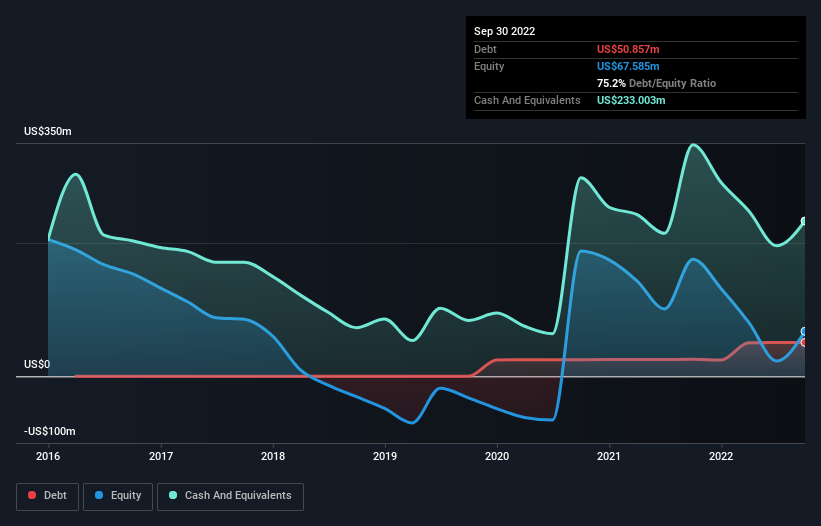Warren Buffett famously said, 'Volatility is far from synonymous with risk.' When we think about how risky a company is, we always like to look at its use of debt, since debt overload can lead to ruin. We note that Seres Therapeutics, Inc. (NASDAQ:MCRB) does have debt on its balance sheet. But is this debt a concern to shareholders?
Why Does Debt Bring Risk?
Generally speaking, debt only becomes a real problem when a company can't easily pay it off, either by raising capital or with its own cash flow. If things get really bad, the lenders can take control of the business. However, a more common (but still painful) scenario is that it has to raise new equity capital at a low price, thus permanently diluting shareholders. Of course, the upside of debt is that it often represents cheap capital, especially when it replaces dilution in a company with the ability to reinvest at high rates of return. The first step when considering a company's debt levels is to consider its cash and debt together.
Check out our latest analysis for Seres Therapeutics
What Is Seres Therapeutics's Debt?
The image below, which you can click on for greater detail, shows that at September 2022 Seres Therapeutics had debt of US$50.9m, up from US$25.5m in one year. However, it does have US$233.0m in cash offsetting this, leading to net cash of US$182.1m.

A Look At Seres Therapeutics' Liabilities
Zooming in on the latest balance sheet data, we can see that Seres Therapeutics had liabilities of US$81.8m due within 12 months and liabilities of US$162.5m due beyond that. Offsetting this, it had US$233.0m in cash and US$1.25m in receivables that were due within 12 months. So it has liabilities totalling US$10.0m more than its cash and near-term receivables, combined.
Having regard to Seres Therapeutics' size, it seems that its liquid assets are well balanced with its total liabilities. So while it's hard to imagine that the US$634.2m company is struggling for cash, we still think it's worth monitoring its balance sheet. While it does have liabilities worth noting, Seres Therapeutics also has more cash than debt, so we're pretty confident it can manage its debt safely. When analysing debt levels, the balance sheet is the obvious place to start. But ultimately the future profitability of the business will decide if Seres Therapeutics can strengthen its balance sheet over time. So if you want to see what the professionals think, you might find this free report on analyst profit forecasts to be interesting.
Over 12 months, Seres Therapeutics made a loss at the EBIT level, and saw its revenue drop to US$13m, which is a fall of 91%. To be frank that doesn't bode well.
So How Risky Is Seres Therapeutics?
By their very nature companies that are losing money are more risky than those with a long history of profitability. And we do note that Seres Therapeutics had an earnings before interest and tax (EBIT) loss, over the last year. Indeed, in that time it burnt through US$236m of cash and made a loss of US$231m. But at least it has US$182.1m on the balance sheet to spend on growth, near-term. Summing up, we're a little skeptical of this one, as it seems fairly risky in the absence of free cashflow. The balance sheet is clearly the area to focus on when you are analysing debt. However, not all investment risk resides within the balance sheet - far from it. For instance, we've identified 4 warning signs for Seres Therapeutics that you should be aware of.
If, after all that, you're more interested in a fast growing company with a rock-solid balance sheet, then check out our list of net cash growth stocks without delay.
New: Manage All Your Stock Portfolios in One Place
We've created the ultimate portfolio companion for stock investors, and it's free.
• Connect an unlimited number of Portfolios and see your total in one currency
• Be alerted to new Warning Signs or Risks via email or mobile
• Track the Fair Value of your stocks
Have feedback on this article? Concerned about the content? Get in touch with us directly. Alternatively, email editorial-team (at) simplywallst.com.
This article by Simply Wall St is general in nature. We provide commentary based on historical data and analyst forecasts only using an unbiased methodology and our articles are not intended to be financial advice. It does not constitute a recommendation to buy or sell any stock, and does not take account of your objectives, or your financial situation. We aim to bring you long-term focused analysis driven by fundamental data. Note that our analysis may not factor in the latest price-sensitive company announcements or qualitative material. Simply Wall St has no position in any stocks mentioned.
About NasdaqGS:MCRB
Seres Therapeutics
A clinical-stage company, focuses on developing biotherapeutics for serious diseases.
Excellent balance sheet with slight risk.
Market Insights
Community Narratives




